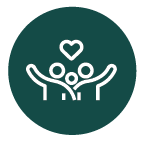Standards and Guidelines
What are Professional Competencies and Standards
Professional competencies and standards define the skills and knowledge required by those working in the early childhood and after-school fields. Since you have a profound impact on the children and families you work with, professional quality matters.
Professional competencies and standards are the foundation of quality in a professional development system. They define the skills and knowledge required by those working in the early childhood and after-school fields. The professional quality of the early childhood workforce has a profound impact on the children and families they work with.
As early care practitioners become professionals in the early childhood and after-school fields, it is essential that they know and follow the ethical standards of the profession. Ethical conduct is a key competency of professionals.
Competence is always developing – no matter what your level in the professional development continuum. Competency develops from experience, coursework, effective supervision and reflective practice.
Professional standards and competencies are used:
- to provide common expectations and language
- as the framework for early childhood and after-school career pathways
- to plan and assess professional development activities and curricula
- as the foundation of a credential
- to develop job descriptions and performance evaluations
- to structure supervision and mentoring
Workforce Knowledge and Competencies
The Arizona Early Childhood Workforce Knowledge and Competencies is a uniform set of expectations that identify the basic knowledge, skills, and abilities needed for early childhood professionals across sectors of early childhood including: early care and education; early intervention; mental and physical health; and social services/child welfare professionals. The set of expectations ensure implementation of quality services for young children and their families.
Be the Best at Your Job
Whether you’re a director or an early childhood teacher, the Arizona Early Childhood Workforce Knowledge and Competencies can help you achieve your best by giving you greater insight into quality early childhood education.
Here’s how you can use it to grow your career and professionalism:

Directors & Administrators
- Provide your staff with an orientation into the early care and education field
- Develop job descriptions
- Develop salary scales
- Track professional development growth
- Assess strengths, challenges, and learning needs for your staff
- Support your staff in creating personalized development plans

Teachers & Assistants
- Assess your skill level, knowledge, strengths, and abilities
- Create your personalized professional development plan
- Identify your learning needs and areas of growth

Family Child Care
- Assess your skill level, knowledge, strengths, and abilities
- Identify your learning needs and areas of growth
- Differentiate yourself from other family child care providers by knowing evidence-based practices
- Track professional development growth
- Create your personalized professional development plan

Prospective Teachers
- Assess your skill level, knowledge, strengths, and abilities
- Differentiate yourself from other teachers and assistants by knowing evidence-based practices
- Identify areas to grow your career and learn how to get there

Instructors & Technical Assistance Providers
- Align competencies with training objectives
- Design and organize professional development opportunities
- Provide trainings that progress through each core knowledge area
Arizona Department of Education
- The Arizona Department of Education’s Early Learning Standards were designed to create a framework for the planning of quality educational experience for children ages three to five, covering a broad range of developmental skills and educational practices that can support their development.
- Arizona’s Infant and Toddler Developmental Guidelines – First Things First, the Arizona Early Childhood Development and Health Board, developed these guidelines to provide a framework for understanding and communicating a set of developmentally appropriate expectations for young children. This guide is designed to help parents, families, and other caregivers understand appropriate milestones, promote healthy growth and development for infants and toddlers, and to promote the development of support services that promote these developmental guidelines to benefit young children and their families.
- Program Guidelines for High-Quality Early Education: Birth Through Kindergarten – This resource provides recommended practices for programs striving to provide excellence in the care and education of young children throughout Arizona.
- Arizona Promising Practices Educating students with Disabilities – This website provides research-driven practice guidelines, strategies, and resources to support professionals and parents in improving results for students with disabilities.
- The Arizona Early Learning Standards (AZELS) and infant & Toddler Developmental Guidelines (ITDG) are now available in Spanish! Resources can be found here.
Instructor and TA Standards
The Professional Development Instructor and Technical Assistance Provider Standards define the credentials, knowledge and experience necessary to ensure high quality professional development experiences for our workforce from entry through advanced levels.
